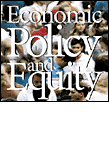 About F&D Subscribe Back Issues Write Us Copyright Information Use the free Adobe Acrobat Reader to view a pdf file of this article
|
Letters Central bank independence Manual Guiti�n's illuminating review of Alan Blinder's Central Banking in Theory and Practice, in Finance & Development, June 1998, raises some critical issues concerning central bank independence. Blinder's definition of central bank independence underestimates its intrinsic ambiguity. He defines it to mean instrument independence, but not goal independence, as well as independence from the financial markets. Its "critical hallmark" is "near irreversibility." But there are also other kinds of independence, de jure and de facto, constitutional and statutory, strategic and tactical, not to speak of degrees of independence. Blinder recognizes that the negative correlation between central bank independence and inflation does not hold for a sufficiently large sample of countries, even using multivariate analysis, and that recent studies have questioned whether correlation implies causation. Therefore, the case of central bank independence rests not on control of inflation but on the insulation of monetary policy from politics, which has been persuasively presented much earlier by Montagu Norman (1932), Plumptre (1937 and 1947), Nordhaus (1975), and Assar Lindbeck (1976). In fact, Plumptre argued that the rationale for independent central banks is basically the same as for an objective civil service. But then "the removal of monetary policy [from] the political sphere is itself a political act" (Jon Elster, 1988). More important, monetary policy is not a stand-alone instrument, and central bank independence is no guarantee of central bank infallibility. Oddly, economists who have studied in depth both government and market failures have been strangely coy in analyzing central bank failures. Blinder does not follow up his tantalizing reference to "many monetary authorities who have failed to acquit themselves with distinction." Yet another intriguing conundrum is why the IMF, after forcefully arguing as early as 1968 "in favor of a high degree of central bank independence" (Frank Southard, Jr., Deputy Managing Director, Finance & Development, June 1968), allowed this now fashionable doctrine to lapse into institutional oblivion. It does not figure as an element of conditionality in the IMF's adjustment programs, whose success seems unrelated to the degree of central bank independence. Clearly, policy conditionality is more critical than institutional conditionality. Is there an agnostic message here for the converted? Anand Chandavarkar
|